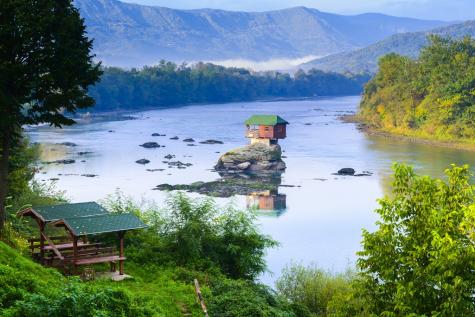
In the third EPR of Serbia, two recommendations were given for the green economy which were to: develop and coordinate green economy approaches and facilitate green economy initiatives; and integrate green economy considerations when revising existing or developing new strategic documents at all levels. Whilst Serbia has made progress in this regard and have partially implemented these recommendations, Serbia should also develop and adopt legislation on the green economy and also harmonise it with intersectoral strategies and regulations. In recognition of these aims, the UNECE has assisted Serbia by creating an overview of the green economy status and subsequent recommendations.
In the areas of renewable energy, energy efficiency and green buildings, Serbia has made great improvements. For example, with data from December 2018, Serbia created over 200 new plants to produce electricity from renewable energy, including 100 small hydropower plants; 105 solar power plants; 4 wind power plants; and 13 biogas power plants. Moreover, for the building sector, a Central registry of energy passports was developed which enables energy efficiency engineers to enter information on the energy certification of buildings. This monitoring system is also a register of licensed energy efficiency engineers and organisations that are authorized to issue energy passports. As a result of these passports, between 2015 and 2017 over 400 were entered into the register.
Concurrently, in the areas of sustainable transport, sustainable agriculture, wastewater management, land management and green public procurement, progress has been limited, especially for those sectors that present relatively new environmental challenges. For example, land degradation is becoming an increasing environmental and socio-economic concern in Serbia. Environmentally unsuitable activities, including the over extraction of ores, inappropriate practices in agriculture and uncontrolled waste disposal, all lead to: erosion; a reduction of organic matter; the disruption of the soil structure; soil acidification; soil pollution; excessive use of chemicals in agriculture and compaction of agricultural land. Moreover, whilst Serbia has favourable land conditions for the agricultural sector, as well as it being a large employment with around 21% of all employees working in agriculture, budget allocations are low, totalling around 5% of the budget. Whilst several laws and programmes have been adopted, especially to comply with EU regulations, more action is necessary. In terms of wastewater, a significant problem is its collection and treatment, of which the networks are in poor condition or non-functional for residential and industrial areas. This presents a significant environmental hazard given the pollution from untreated wastewater. Moreover, whilst in all areas of the green economy there is a lack of an educated workforce ready to meet these demands, the problem is particularly pronounced for the water management sector.
Through this overview of the situation in Serbia on its path towards the green economy, recommendations have been proposed for Serbia by the UNECE. These include proposals to:
- Prepare a strategic document for a green economy;
- Align ross-sectoral strategic goals and action plans of strategies;
- Further align the strategic framework in this area with EU strategies, goals and timeframes;
- Improve the regulatory framework for the green economy;
- Strengthen the institutional capacity for coordination and monitoring the implementation of public policy implementation plans;
- Intensify the use of renewable energy sources;
- Increase the energy efficiency in industry, building construction and the transport sector, by rationalising energy consumption through an exponential increase in costs with fiscal support mechanisms;
- Develop a National Action Plan for Green Public Procurement, define criteria for individual product groups, train key participants in the green public procurement process, and revise public procurement officer's manuals and existing guidelines;
- Establish a transparent and consistent system and institutional framework for environmental financing;
- Create incentives and capital investments in various sectors of the green economy;
- Improve the interdepartmental cooperation of the ministries whose scope of work is relevant for the green economy issues;
- Improve the support for technology and innovation;
- Place a special emphasis on education in primary and secondary education on environmental issues as well as on new jobs emerging in the green economy is required due to the need for specialised workforce;
- Increase investments and programmes in the field of social science research in aspects of the green economy, such as social and gender aspects, inclusion, poverty and other issues;
- Improve databases and data quality.
These recommendations could eventually serve as a roadmap for future actions to implement the green economy in Serbia.

